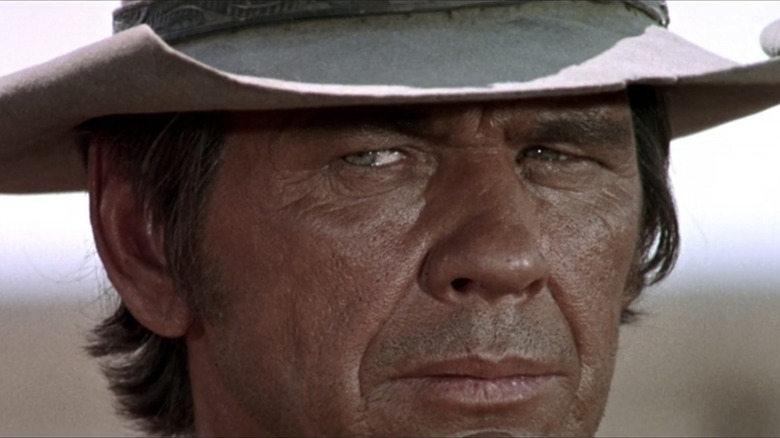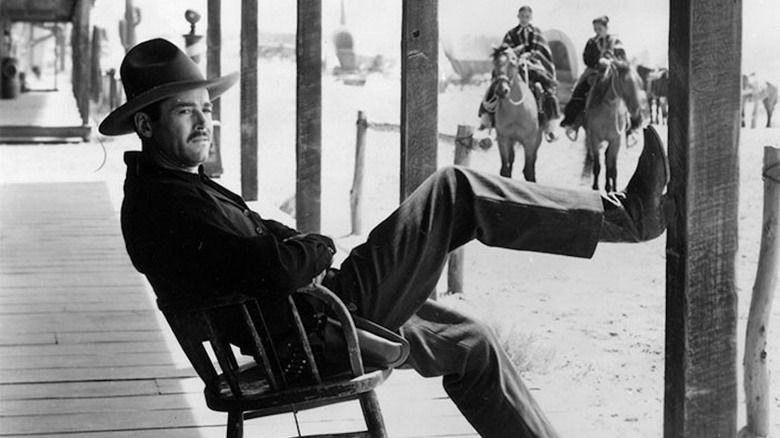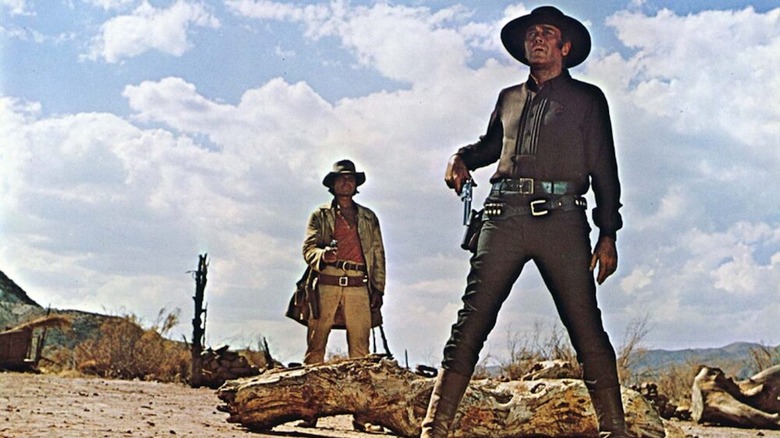Sergio Leone Borrowed Some John Ford 'Pessimism' For Once Upon A Time In The West
No single Hollywood filmmaker did more to mythologize America's manifest destiny than John Ford. His Westerns, typically shot in tandem with a larger-than-life John Wayne, told two-fisted tales of hard men who braved attacks from outlaws and resistance from indigenous people to bring a European notion of civilization to a supposedly untamed land. Technically speaking, he played a crucial role in codifying the grammar of visual storytelling (everything you ever need to know about the basics of camera placement and mise-en-scène are on display in his films), but it's really his gruff sentimentality about the brutal work of westward expansion that defines the formative majority of his oeuvre.
Though Ford allowed for shades of gray in films like "My Darling Valentine" and "3 Godfathers," he didn't explicitly sour on the myth he'd played a pivotal role in propagating until 1956's "The Searchers." In Wayne's racist protagonist, Ethan Edwards, Ford found a character through which to filter the nation's guilt about the cruelly calculated slaughter that brought about the taming he'd heretofore celebrated. Ford boosted his ambivalent subtext to text in 1962's "The Man Who Shot Liberty Valance," wherein the heroic, gunslinging exploits of a popular politician (James Stewart) are revealed to be fraudulent. Coming from the man who'd turned Wayne into the epitome of the American male, the reverberations were immediate and profound. An upstart Italian director named Sergio Leone felt them.
Printing an ugly legend
Leone's Spaghetti Westerns were progressive pastiche. His "Man with No Name" trilogy starring Clint Eastwood expressed a wry distrust of the authoritative, cinematic history laid down by Ford and his cohorts. Eastwood played a mercenary in the first movie, but after working from Akira Kurosawa's ronin-of-the-people model on "A Fistful of Dollars," the director veered off in a viciously cynical direction with his next two movies. Then came "Once Upon a Time in America." Sam Peckinpah's "The Wild Bunch" is widely cited as the most important revisionist Western coming out of the Ford-driven classical era, but Leone's elegiac saga is, aesthetically and emotionally, the film that fed off the disillusionment of "The Man Who Shot Liberty Valance" to create a bold new grammar for the nearly irrelevant genre.
Leone spoke to the importance of Ford's final masterpiece prior to his untimely death in 1989 at the age of 60.
"The Ford film I like most of all — because we are getting nearer to shared values — is also the least sentimental, 'The Man Who Shot Liberty Valance.' We certainly watched that when we were preparing 'Once Upon a Time in the West.' Why? Because Ford finally, at the age of almost 65, finally understood what pessimism is all about. In fact, with that film Ford succeeded in eating up all his previous words about the West — the entire discourse he had been promoting from the very beginning of his career. Because 'Liberty Valance' shows the conflict between political forces and the single, solitary hero of the West ... He loved the West and with that film at last he understood it."
How the Western was radicalized
Leone's leftist politics led him to the Zapata Western trappings of "Duck, You Sucker," in which Rod Steiger's outlaw is dragged into the Mexican Revolution of the early 20th century by James Coburn's Irish radical. The director has claimed that this film is primarily about friendship, but it is impossible to walk away from his cut of the film feeling anything other than contempt for the U.S. and its interventionist policies.
Such radicalism would not have agreed with Ford's stodgy conservatism, even post-"Liberty Valance," but you have to think the old man would've appreciated on some unspoken level the genre he pioneered being pushed forward by an artist committed to its survival. It's fallen in and out of fashion, but the Western is still with us, as is the ugliness of the conquest that united the U.S. in 48 contiguous states. We probably wouldn't be watching Westerns had Leone not turned Henry Fonda, the morally upright pillar of Ford's "My Darling Clementine," into a child-killing monster.


